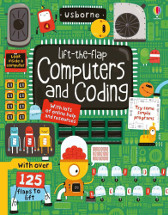Lift-the-flap computers and coding by Rosie Dickins

Ill. by Shaw Nielsen. Usborne, 2015. ISBN 9781409591511
Among the stated outcomes of the Digital Technologies strand of the Australian Curriculum for students
in Foundation to Year 2 are the ability to 'recognise and explore
digital systems (hardware and software components) for a purpose'
and 'follow, describe and represent a sequence of steps and
decisions (algorithms) needed to solve simple problems'. So
right from their first years of formal schooling, our students are
expected to be able to understand the parts of a computer, use
software and begin to manipulate the devices to meet their needs.
This book with its myriad of flaps to lift and explore is perfect
for introducing this age group to what computers are and how they
work. Starting with 'What's a computer?' and an explanation of what
coding is, it moves on to show how computers think, including lots
of interactive activities that encourage the reader to participate
and thus gain a better understanding of the focus topic. For
example, the binary code is explained and then the reader is
challenged to convert decimal numbers to binary with the answers
under the flaps. Pictures via pixels are explained and so are
colours. There's even a treasure map to help Pixel the Pirate hunt
for treasure while teaching about writing instructions and flow
charts. The flaps reveal answers, explanations and things to think
about ensuring that the reader is actively engaged in their
learning.
The more I delved into this book the more I went back to my early
days of learning to program a turtle using Logo and even earlier
still to when we bought books with the coding for games in them and
we put these into our basic computers which ran on audio tapes! This
book encourages kids to explore and use Scratch which is so
highly recommended by my computer guru colleagues and just continues
on with so much info and fun that I'm surprised it hasn't been
written before!
But even if you buy multiple copies of this for your students, you
should also consider buying it for those teachers who feel daunted
by the requirements of the curriculum because apart from helping
them understand the technical aspects of computers and coding, it
offers a myriad of ideas for supporting the learning within the
classroom using activities that don't require a device. You might
also like to scour your TR section for all those books about
encouraging logical thinking and problem solving that were so common
a few years ago because they are all grist to the mill, and also
return to the basics of the information literacy process of
What am I being asked to do?
What do I already know?
What more do I need to find out?
Where can I find that information?
So even if writing a million-dollar-making app is beyond the reach
of many nevertheless they will have had lots of scaffolding and
experience in thinking logically, posing and answering questions and
solving problems - which all the futurists says are the essential
foundation skills for the future.
Barbara Braxton